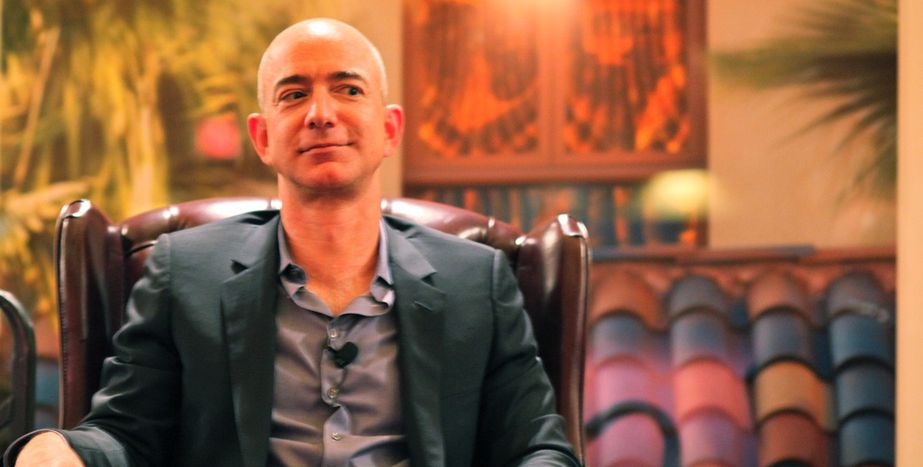
Amazon, what's their secret?
Published on
Translation by:
Emanuel Nevárez PagánBeginning of 2000 : Amazon has become the beacon of the flourishing e-commerce, with an exceptional growth and an increasing client base. Fifteen years later, this giant has become almost unstoppable. But lately its Marketplace policies and its global vision of the market are no longer making it « the place to be »...
When Jeff Bezos founded Amazon in 1994, he decided to name its company after the largest river in the world, a clear reflection of what he had in mind for his company. Although it began selling books, soon enough Amazon wanted to surpass the boundaries imposed by what seemed to be an outdated model of mass distribution, all of this possible by the unlimited potential afforded by the internet. An amazing selection of products, with the most affordable prices anywhere else. Using this same revolutionary model, they broadened their product base, and introduced a policy aimed at complete client satisfaction (SAV, faster shipping...). The result: business is booming, and with a whopping 2,8 billion dollars during their first 5 years (unlike Google, reaching only 1,5 billions), its audience it's quickly exceeding those of its competitors.
Its catalog takes on a whole new dimension when they finally launch their Marketplace, allowing other businesses to sell their products on their brand new platform. These new clients can now take full advantage of the immense trafic generated by the website and its recommendations for better advertisement of their products. No company will be able to match the unparalleled sucess that this Goliath has had. It has become untameable, yet it still remains the most powerful ally for countless providers and sellers alike.
A shark in a pond
Little by little, however, its agressive comercial methods are slowly ruining its reputation. The latest example : Amazon US wanted one of the biggest publishing houses in the United States, Hachette Book Group, to raise the discounts on merchandise it had been awarding them. There were no fair negotiations, they were practically blackmailed. When they refused to comply, they were severely punished by delayed orders and boosted prices. An effective way to discourage further opposition amongst its seller ranks by reminding them its predominance over the market. Despite these threats, Hachette is not the only one paying the hefty price of insubordination. Many publishing houses have experienced similar treatment by Amazon : MacMillan, Bonnier and even IPG are some of the best known examples.
This same «dictatorial» philosophy is beginning to be denounce openly by sellers of the Marketplace : arbitrary termination of accounts, retention of payments, commission hikes...
A model on the edge of collapse?
 Although this commercial beast dominates the market with its sheer size, it's fully aware of its own weaknesses. Its successful policy, which allows for lower prices and free delivery isn't a profitable practice after all, no matter how effective its distribution method may be. Although its business continues to thrive, its profits are barely noticeable (74,45 billions CA in 2013, an increment of 22% from 2012... but only 274 millions in profits). By itself, this practice will eventually weed out those competitor that can't effectively match Amazon's rock-bottom prices, thus giving it the leverage it needs to carry out an offensive move against those providers who no longer have the muscle to maintain the balance during negotiations. As a consequence, the market is thrown into a vortex of deflation. There seems to be no solution in sight : since 1997, its shareholders haven't received any substantial dividends. They are growing impatient and Amazon risks further alienating its providers and seller with this burden.
Although this commercial beast dominates the market with its sheer size, it's fully aware of its own weaknesses. Its successful policy, which allows for lower prices and free delivery isn't a profitable practice after all, no matter how effective its distribution method may be. Although its business continues to thrive, its profits are barely noticeable (74,45 billions CA in 2013, an increment of 22% from 2012... but only 274 millions in profits). By itself, this practice will eventually weed out those competitor that can't effectively match Amazon's rock-bottom prices, thus giving it the leverage it needs to carry out an offensive move against those providers who no longer have the muscle to maintain the balance during negotiations. As a consequence, the market is thrown into a vortex of deflation. There seems to be no solution in sight : since 1997, its shareholders haven't received any substantial dividends. They are growing impatient and Amazon risks further alienating its providers and seller with this burden.
A win-win situation no longer feasible.
After wreaking havoc amongst its competitors, Amazon has now become a threat to its partners as well. The pressure it has imposed on prices could lead to the decline, and even death of its providers. And with them, numerous production lines. The book industry seems to be heading for a cliff, despite the many efforts by the publishing houses.
As for the Marketplace, the host has become the enemy : Amazon can use its sellers' most impressive statistics to improve its own, successfully undermining its competition. « They use the Marketplace to figure out what to sell. This is a serious unethical practice », explains Pierre Kosciusko-Morizet, head of PriceMinister.
Similar to this, Amazon uses its audience and popularity to charge a fee for its services : « its real business model isn't really selling products that aren't all that profitable, but to generate as much trafic as possible in order to make real profits from its services. There lies the root of the deflation that is currently strangling part of the economy », warns a competitor quoted on Libération.
Could this winning recipe turn against the internet giant ? Its methods have been denounced, its predominance in the market continues to bring ethical and legal problems. In addition to this, its « client oriented » image could be permanently tarnished. Can Amazon retain its allure, claiming to offer the lowest prices and faster deliveries while promoting its own products 50% more expensive and 10 times slower than its competitors ? One thing is certain : its place at the top it's in serious jeopardy...
Translated from Amazon, à sa guise ?



